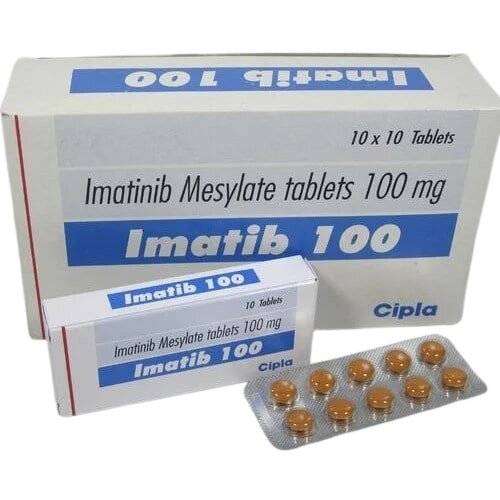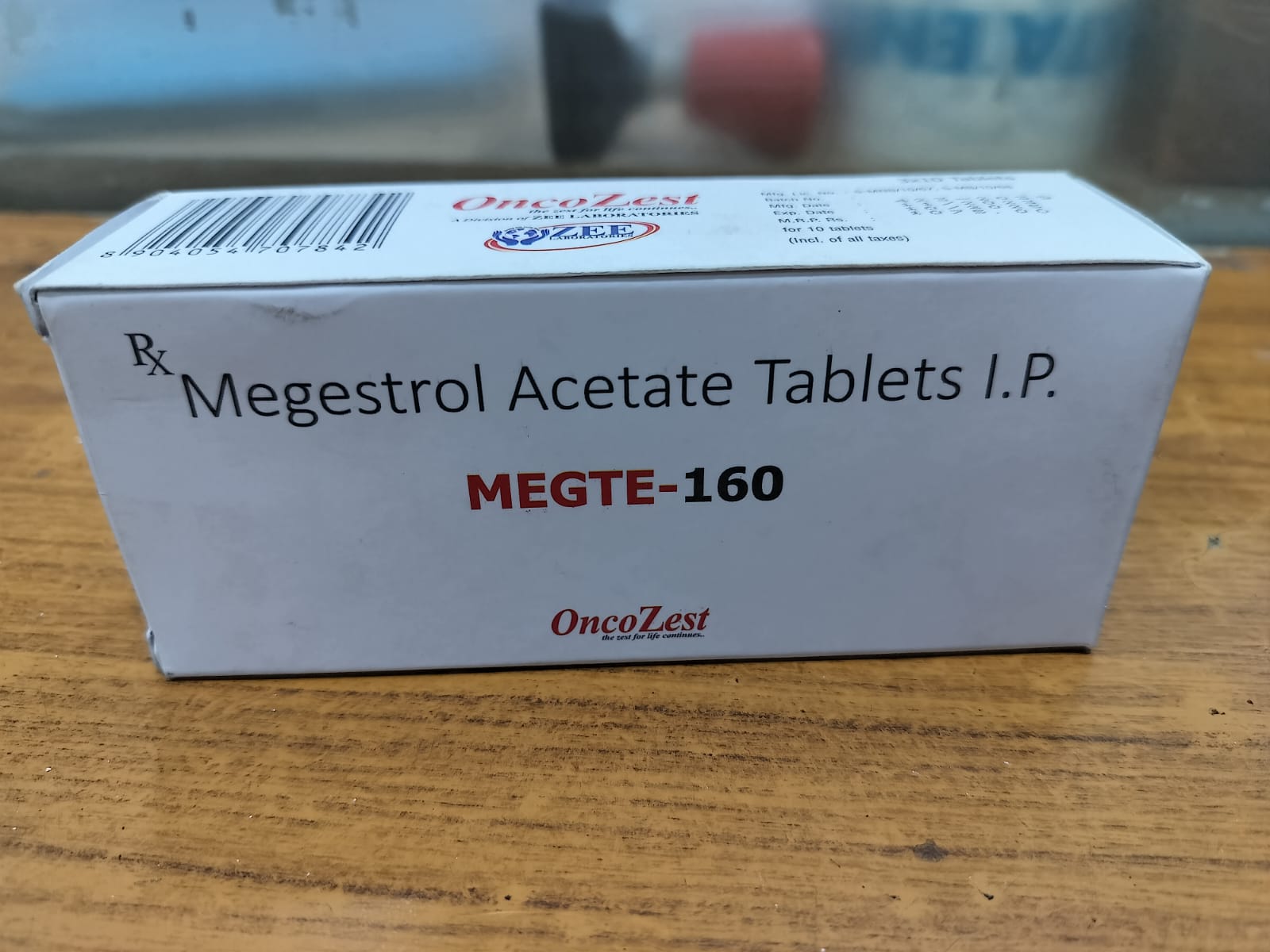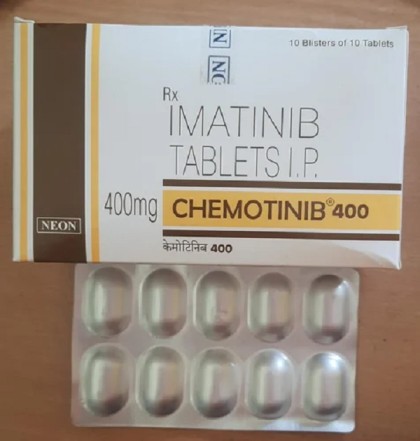Product Introduction:
Imatib is a prescription anticancer drug designed to treat certain blood and soft tissue cancers. It inhibits abnormal tyrosine kinases that drive the uncontrolled growth of cancer cells. The medication is manufactured by Cipla Ltd., one of India's leading pharmaceutical companies, and is available in 100 mg and 400 mg tablet strengths.
Uses (Indications):
Imatib is used in the treatment of various cancers involving specific tyrosine kinase mutations:
-
Chronic Myeloid Leukemia (CML) – First-line treatment in chronic, accelerated, and blast phases
-
Philadelphia Chromosome-Positive Acute Lymphoblastic Leukemia (Ph+ ALL)
-
Gastrointestinal Stromal Tumors (GIST) – Particularly KIT (CD117)-positive tumors
-
Hypereosinophilic Syndrome (HES) and Chronic Eosinophilic Leukemia (CEL)
-
Aggressive Systemic Mastocytosis (ASM)
-
Myelodysplastic/Myeloproliferative Diseases (MDS/MPD) with PDGFR gene abnormalities
-
Dermatofibrosarcoma Protuberans (DFSP) – Especially in unresectable or metastatic disease
Storage Instructions:
-
Store below 30°C, in a dry place.
-
Protect from light and moisture.
-
Keep in original packaging to maintain stability.
-
Keep away from children and pets.
-
Do not use the tablets beyond the expiry date mentioned on the pack.
How It Works (Mechanism of Action):
Imatinib, the active component of Imatib, is a selective tyrosine kinase inhibitor. It works by:
-
Blocking the ATP-binding site on abnormal tyrosine kinase proteins such as BCR-ABL, KIT (CD117), and PDGFR.
-
Inhibition of these kinases prevents phosphorylation and activation of downstream signaling pathways involved in cancer cell proliferation, survival, and resistance.
-
This targeted mechanism leads to the death of cancerous cells, while sparing most normal cells, making it a more selective and tolerable therapy compared to conventional chemotherapy.
Side Effects:
Common Side Effects:
-
Swelling around eyes and ankles (fluid retention)
-
Nausea, vomiting, abdominal discomfort
-
Muscle cramps
-
Rash, pruritus (itching)
-
Fatigue and headache
-
Diarrhea or constipation
Serious Side Effects:
-
Myelosuppression: Low white cells, platelets, or hemoglobin – risk of infection and bleeding
-
Hepatotoxicity: Liver enzyme elevations or jaundice
-
Cardiac complications: Congestive heart failure (rare but serious)
-
Severe edema: Pulmonary or pericardial effusion
-
Tumor Lysis Syndrome (TLS): Rapid tumor breakdown leading to metabolic disturbances
-
Stevens-Johnson Syndrome: Life-threatening skin reaction (rare)
Dosage (Typical Recommended Dose):
Adult Dosage by Condition:
-
Chronic phase CML: 400 mg orally once daily
-
Accelerated/blast phase CML: 600 mg once daily
-
GIST: Start with 400 mg once daily; can increase to 800 mg if disease progresses
-
Ph+ ALL or other malignancies: 600 mg daily
-
Pediatric CML: Dosage based on body surface area (typically 260–340 mg/m²)
Note: Dosage adjustments may be needed based on tolerance, response, or drug interactions. Regular monitoring is essential.
Method of Administration:
-
Take by mouth, once daily at the same time each day.
-
Should be taken with a meal and a full glass of water to reduce stomach upset.
-
Tablets should be swallowed whole.
-
For patients unable to swallow, tablets may be dispersed in water or apple juice, stirred, and consumed immediately.
Precautions:
-
Routine monitoring of blood counts, liver and kidney function is mandatory.
-
Caution in patients with liver or heart disease.
-
Avoid alcohol, as it may increase liver toxicity.
-
Not recommended during pregnancy – known risk of fetal harm.
-
Effective contraception must be used during and for 1 month after treatment.
-
Use cautiously in children – may affect growth and development.
Drug Interactions:
-
CYP3A4 inhibitors (e.g., ketoconazole, erythromycin): may increase blood levels of Imatinib → increased risk of toxicity
-
CYP3A4 inducers (e.g., rifampin, phenytoin): may reduce effectiveness
-
Acetaminophen (Paracetamol): potential for liver enzyme interaction
-
Warfarin and NSAIDs: increased risk of bleeding
-
Avoid live vaccines due to immunosuppressive effects
Allergies (Warnings for Allergic Reactions):
-
Hypersensitivity reactions are rare but possible.
-
Symptoms include rash, swelling, fever, difficulty breathing.
-
Severe reactions like anaphylaxis or Stevens-Johnson Syndrome require immediate discontinuation and emergency care.
-
Do not use if allergic to Imatinib or related excipients.
Overdose Information:
-
Symptoms of overdose may include nausea, vomiting, diarrhea, rash, swelling, fatigue, and low blood cell counts.
-
There is no specific antidote; treatment is symptomatic.
-
Hospitalization and supportive care (IV fluids, electrolyte correction) may be required.
-
Involve a poison control center or emergency department immediately.
Missed Dose Instructions:
-
If a dose is missed, take it as soon as remembered.
-
If it’s close to the next scheduled dose, skip the missed dose – do not double up.
-
Maintain regular timing for maximum efficacy.
-
If multiple doses are missed, consult the treating oncologist.
Additional Notes:
-
Imatib is a cost-effective alternative to Glivec®, especially in low-resource settings.
-
Regular monitoring and adherence are critical to long-term disease control.
-
Therapy is often lifelong in CML, and patient education is key to managing expectations and side effects.
-
Available through government reimbursement or NGO programs in many regions for cancer care.
-
Patients should report any unusual symptoms promptly for timely intervention.




